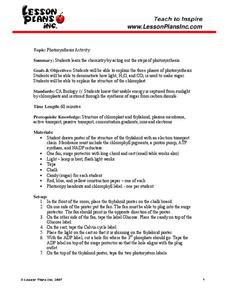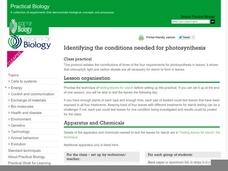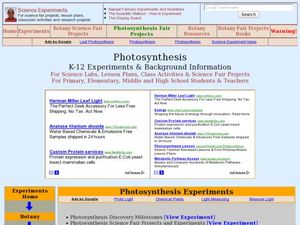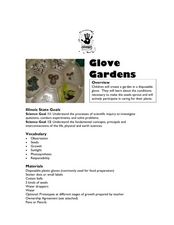LABScI
Photosynthesis: How Do Plants Get Energy?
Examine the mechanism of photosynthesis through different light scenarios. Pupils vary the amount and type of light exposure on plant leaves in the fifth lesson plan in a 12-part series. Through observation, they determine the rate of...
Lesson Plans
Photosynthesis Activity
When is the last time pupils did a happy dance in class? Scholars act out photosynthesis and dance excitedly in front of the class. The resource also comes with a worksheet for those waiting or who have already completed the activity....
Curated OER
Photosynthesis, Respiration, and the ATP-ADP Cycle
Students explore the processes of photosynthesis and respiration. In this photosynthesis and respiration lesson plan, students learn about the role of the chloroplasts in photosynthesis and about the role of mitochondria in respiration...
Nuffield Foundation
Identifying the Conditions Needed for Photosynthesis
Budding biologists often ask how scientists know what they do about different topics. In the lab described here, they have a chance to find out first-hand about the requirements for photosynthesis. Three sequential investigations are...
Curated OER
Biological Molecules
Ninth graders examine the structure and function of biomolecules. In this food molecule lesson plan, 9th graders will examine various types of biomolecules such as carbohydrates, lipids, proteins, and nucleic acids. They will analyze...
Curated OER
Life Cycle of a Plant: How Living Things Grow and Die
An engaging slide show for 2nd graders introduces them to the life cycle of plants. Students match up plant vocabulary words to their correct definition. Pairs of students play a vocabulary game, then students must draw and label leaves,...
Curated OER
Photosynthesis
Fourth graders discuss and identify the components of photosynthesis and the products of this process. They participate in a class discussion about the importance of oxygen, and in small groups act out the process of photosynthesis. ...
Curated OER
Fun Photosynthesis
Second graders, using large colored poster board, explore photosynthesis and its effect on the food chain and survival of organisms.
Curated OER
Everybody Needs a Little Sunshine
Three activities introduce upper elementary ecologists to photosynthesis and food webs. In the first, an experiment is set up to determine how plants respond to different types of light. In the second, they connect organism cards with...
Curated OER
Ecology of the Savanna-Forest Boundaries in Central Brazil
Students explore photosynthesis. In this photosynthesis instructional activity, students label parts of photosynthesis and take notes. Students conduct experiments on leaves, make observations and record their findings.
Curated OER
How Plants Help Us Breathe
Third graders discuss how humans breathe and how plants help us to stay alive. In groups, they identify and label the different parts of plants and describe their functions. They compare and contrast the ways plants and animals breathe...
Curated OER
Photosynthesis and Plant Reproduction
Learners explain the process of photosynthesis. For this biology lesson, students label the different reproductive parts of the flowers. They watch a short video then identify the leaf parts on the board.
Curated OER
Graphing Greenery
Students gather leaves and trace them on graph paper. They plot coordinates that approximate the shape of the leaves and share those coordinates as "worksheets" for other students to complete.
Curated OER
Photosynthesis
Pupils explore the concept of photosynthesis. They describe the light and light independent reactions of photosynthesis. Students relate physical plant characteristics to their functions. They distinguish between C3, C4, and CAM plants...
Curated OER
Protists - The Protozoans
Five pages provide thorough coverage of three protozoans: euglena, amoebae, and paramecia. For each, junior biologists read factual text, label the organism, and write answers to several questions. This neatly organized assignment is...
Curated OER
Glove Gardens
Students investigate how seeds sprout. In this scientific inquiry instructional activity, students make predictions on which seeds will grow the fastest and observe the seeds over a period of time. Observations are recorded into a...
Curated OER
How about a Little Give and Take?
Middle schoolers design a closed system to test the relationships between plants and animals. They monitor abiotic fluctuations within this living system by using a chemical test kit. They observe how living organisms respond to...
Global Change
The Carbon Cycle and its Role in Climate Change
So how does the carbon cycle work? Kids participate in a hands-on activity that allows them to understand the chemistry behind climate change and global warming. They act out the process of photosynthesis by labeling themselves as...
NOAA
Deep-Sea Ecosystems – Chemosynthesis for the Classroom
Photosynthesis was discovered in the 1770s, but chemosynthesis wasn't discovered until 1977. While many have performed an experiment to show how photosynthesis works, the activity allows pupils to observe chemosynthesis. Scholars set up...
Curated OER
Coral Polyp Party
Learners complete a project where they label the parts of a coral polyp and discuss the differences between plants and animals. Students use marshmallows, sprinkles, toothpicks, and more to label their coral polyp.
Curated OER
Testing Leaves for Starch: the Technique
Like good scientists, kids often want to see first-hand why things are as they are; they can do just that in the starch-testing photosynthesis activity found here. Depending on the age of your pupils, you may wish to do the investigation...
Curated OER
It Ain't Easy Being Green!
Students explore the needs of plants. In this science instructional activity, students plant seeds and place one in a sunny spot and the other in a dark area. Students observe what happens.
Curated OER
Plant Sleuth
Young scholars learn about the parts of a plant, and how plants live and grow.
Virginia Department of Education
The Cycles of Nature
Encourage peer collaboration and assist with the creation of visual aids to identify carbon, water, and nitrogen cycles as your class learns more about nature. They discuss relative information, create a visual aid depicting the chosen...

























